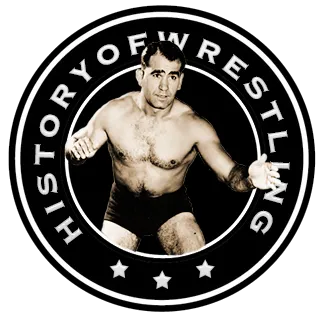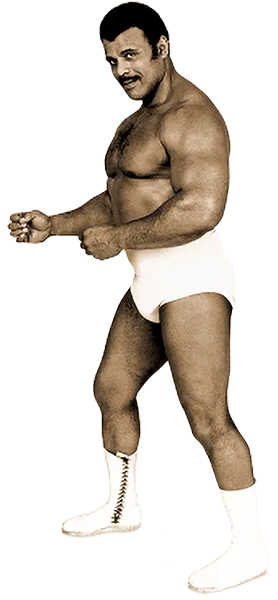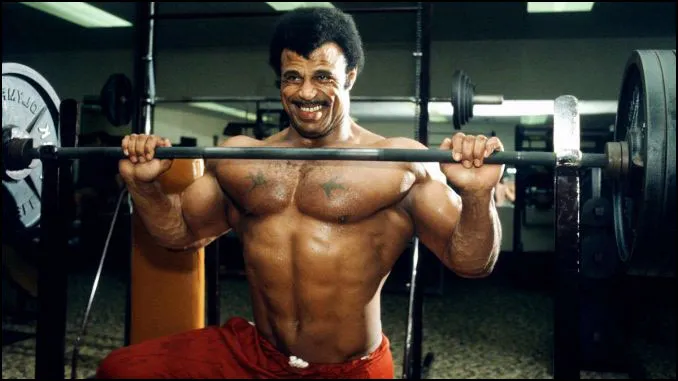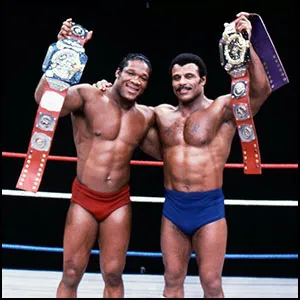by Stephen Von Slagle
Rocky Johnson, the well-spoken, intelligent and athletic babyface from Nova Scotia, never allowed himself to be portrayed in a manner that he felt was demeaning, despite the stereotypical nature of professional wrestling that was so prevalent during his time in the business. Portrayed as a groundbreaking role model for people of all races, the talented Johnson blazed a trail which countless others (including his famous son) could use to follow. And, as one of the most well-travelled performers of his era, he also provided excitement and thrills for fans in virtually every corner of pro wrestling’s territorial globe.
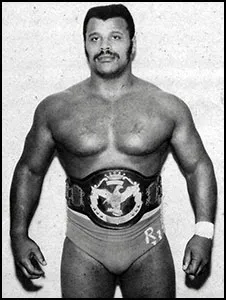 “The Soul Man” was born Wayde Douglas Bowles on August 24, 1944 in Amherst, Nova Scotia, the descendant of Black Loyalists who, following the American Revolutionary War, immigrated north to Canada. As a teenager, he moved to Toronto and it was there that Bowles discovered his love of combat sports, namely boxing and wrestling. Although he preferred wrestling, he excelled quicker as a boxer, and while he never turned pro, the talented Bowles was a sparring partner for champions such as Henry Clark, George Foreman and Muhammad Ali. Meanwhile, he continued to pursue his passion and in 1964 the muscular 6’2″ 250 lb. rookie made his pro wrestling debut under the name Drew Glasteau. After gaining some experience in eastern Canada, Bowles began competing as (and, later, legally changed his name to) Rocky Johnson, in honor of his two favorite boxers, Rocky Marciano and Jack Johnson.
“The Soul Man” was born Wayde Douglas Bowles on August 24, 1944 in Amherst, Nova Scotia, the descendant of Black Loyalists who, following the American Revolutionary War, immigrated north to Canada. As a teenager, he moved to Toronto and it was there that Bowles discovered his love of combat sports, namely boxing and wrestling. Although he preferred wrestling, he excelled quicker as a boxer, and while he never turned pro, the talented Bowles was a sparring partner for champions such as Henry Clark, George Foreman and Muhammad Ali. Meanwhile, he continued to pursue his passion and in 1964 the muscular 6’2″ 250 lb. rookie made his pro wrestling debut under the name Drew Glasteau. After gaining some experience in eastern Canada, Bowles began competing as (and, later, legally changed his name to) Rocky Johnson, in honor of his two favorite boxers, Rocky Marciano and Jack Johnson.
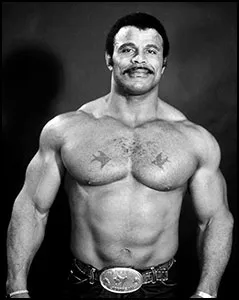 With lightning quick speed, tremendous strength and possessing a dropkick that was truly a thing of beauty, Johnson was already a main event talent and working at the top of the cards for major Canadian promotions like Frank Tunney’s Maple Leaf Wrestling, Stu Hart’s Stampede Wrestling, and Rod Fenton’s All Star Wrestling after just two years in the sport,. It was in Fenton’s Vancouver promotion that the young Johnson engaged in his first big feud (against John & Chris Tolos) and also won his first championship, the Canadian Tag Team title, with partner Don Leo Jonathan. Following his stay in Vancouver, Johnson travelled to the Detroit territory, where he teamed with Ben Justice to defeat the Hell’s Angels (Ron and Paul Dupree) on January 18, 1969 to win the NWA World Tag Team championship. After his stint in Detroit was finished, Johnson headed west to Los Angeles and almost immediately engaged in a major feud with the area’s top heel, “Classy” Fred Blassie. The rivalry between Johnson and Blassie was explosive, both in the ring and at the box office, and the two traded the prestigious Americas Heavyweight title four times between January of 1970 through June of the same year. While wrestling in the L.A. territory, Johnson also captured the NWA Beat the Champ Television Championship twice and the Americas Tag Team title (w/Earl Maynard).
With lightning quick speed, tremendous strength and possessing a dropkick that was truly a thing of beauty, Johnson was already a main event talent and working at the top of the cards for major Canadian promotions like Frank Tunney’s Maple Leaf Wrestling, Stu Hart’s Stampede Wrestling, and Rod Fenton’s All Star Wrestling after just two years in the sport,. It was in Fenton’s Vancouver promotion that the young Johnson engaged in his first big feud (against John & Chris Tolos) and also won his first championship, the Canadian Tag Team title, with partner Don Leo Jonathan. Following his stay in Vancouver, Johnson travelled to the Detroit territory, where he teamed with Ben Justice to defeat the Hell’s Angels (Ron and Paul Dupree) on January 18, 1969 to win the NWA World Tag Team championship. After his stint in Detroit was finished, Johnson headed west to Los Angeles and almost immediately engaged in a major feud with the area’s top heel, “Classy” Fred Blassie. The rivalry between Johnson and Blassie was explosive, both in the ring and at the box office, and the two traded the prestigious Americas Heavyweight title four times between January of 1970 through June of the same year. While wrestling in the L.A. territory, Johnson also captured the NWA Beat the Champ Television Championship twice and the Americas Tag Team title (w/Earl Maynard).
Having conquered L.A., Johnson’s next move was to Roy Shire’s San Francisco territory, which at the time was arguably the most talent-rich promotion in America. On September 18, 1971, Johnson teamed with Pepper Gomez to defeat the formidable team of Pat Patterson and “Superstar” Billy Graham for the NWA World Tag Team championship. “The Soul Man” also captured the area’s top prize, the U.S. Heavyweight championship, and held it for three months before being dethroned by Pat Patterson on February 12, 1972. However, a Patterson babyface turn later in the year led to an inspired pairing of Johnson & Patterson that resulted in three different NWA World Tag Team reigns for the popular duo between 1972-1973.
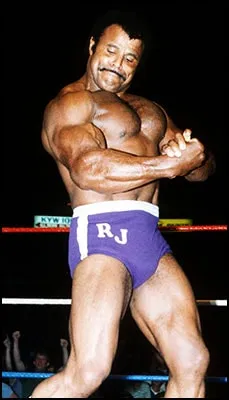 After leaving California, Johnson made several very successful territorial stops, most notable being Georgia. Texas, Memphis, and Florida. In Georgia, Johnson became the first African-American Georgia Heavyweight champion when he defeated Buddy Colt on December 6, 1974. While in the Peachtree State, he also won the Georgia Tag Team title, with partner Jerry Brisco, on January 26, 1975. In Memphis, Johnson engaged in a highly profitable feud with Jerry Lawler, defeating Lawler on November 1, 1976 for the NWA Southern Heavyweight title and drawing sellouts to the Mid South Coliseum on several occasions. Shortly after entering the Texas territory in 1976, Johnson won the Texas Heavyweight championship, as well as the Texas Tag Team title on March 3, 1976. In the Sunshine State, he defeated James J. Dillon to capture the Florida TV title on July 31, 1975, as well as the Florida Tag Team title (with partner Pedro Morales) on September 19, 1977. However, his biggest championship victory in Florida came when (just as he had done a few years earlier in Georgia) Rocky Johnson became the first African-American wrestler to win the Florida Heavyweight championship, defeating “Killer” Karl Kox on March 8, 1978. Johnson was also a frequent main-eventer in the St. Louis, Portland and Mid Atlantic promotions.
After leaving California, Johnson made several very successful territorial stops, most notable being Georgia. Texas, Memphis, and Florida. In Georgia, Johnson became the first African-American Georgia Heavyweight champion when he defeated Buddy Colt on December 6, 1974. While in the Peachtree State, he also won the Georgia Tag Team title, with partner Jerry Brisco, on January 26, 1975. In Memphis, Johnson engaged in a highly profitable feud with Jerry Lawler, defeating Lawler on November 1, 1976 for the NWA Southern Heavyweight title and drawing sellouts to the Mid South Coliseum on several occasions. Shortly after entering the Texas territory in 1976, Johnson won the Texas Heavyweight championship, as well as the Texas Tag Team title on March 3, 1976. In the Sunshine State, he defeated James J. Dillon to capture the Florida TV title on July 31, 1975, as well as the Florida Tag Team title (with partner Pedro Morales) on September 19, 1977. However, his biggest championship victory in Florida came when (just as he had done a few years earlier in Georgia) Rocky Johnson became the first African-American wrestler to win the Florida Heavyweight championship, defeating “Killer” Karl Kox on March 8, 1978. Johnson was also a frequent main-eventer in the St. Louis, Portland and Mid Atlantic promotions.
As athletic, talented and charismatic as Rocky Johnson was, it’s no wonder that he rose to the top of the wrestling world so quickly. Beginning in 1974, Johnson was receiving NWA title shots, first in scientific babyface vs. babyface matches with Jack Brisco before graduating to full-on bloodbaths with NWA kingpins Terry Funk, Harley Race and, eventually, Ric Flair.
In 1982, Johnson entered the World Wrestling Federation and was soon paired with a manager, “Nature Boy” Buddy Rogers. With the sophisticated former champion in his corner, Johnson engaged in several major feuds, primarily with Don Muraco and Greg “The Hammer” Valentine, as well as with Adrian Adonis. However, his early-1980s run in the World Wrestling Federation is most remembered by his tag team with “Mr. USA” Tony Atlas, collectively known as The Soul Patrol. Together, Johnson and Atlas became the WWF’s first African-American tag team champions on November 15, 1983 when they defeated Lou Albano’s Wild Samoans in Allentown, Pennsylvania. The Soul Patrol had everything it took to be the best; strength, speed, experience, and talent. However, the one ingredient they lacked also happened to be essential for a long-lasting tag team… camaraderie. Ultimately, Johnson and Atlas just simply didn’t like each other. Which is a shame, because during their five months as tag champions, the powerhouse duo showed that they had everything needed to become a truly legendary team. But, it was not meant to be and The Soul Patrol met its demise on April 17, 1984 when they were defeated by The North/South Connection (Adrian Adonis & Dick Murdoch).
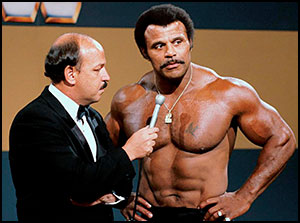 Following his run in the WWF, Johnson returned to Hawaii, where his mother-in-law ran Polynesian Pro Wrestling. While PPW had once been a thriving promotion, by the mid-1980s it was suffering through the same problems that most other smaller territories were experiencing at the time. That said, PPW was still able to draw some big houses and maintained strong ratings for its television program, and Johnson bought a management stake in the promotion, the same organization that was once run by his father-in-law, “High Chief” Peter Maivia. Unfortunately for all involved, including Johnson, Polynesian Pro soon met its demise and Johnson lost a great deal of his savings as a result. With no real options in terms of earning the kind of money wrestling provided, he returned to the ring despite his advancing age, working in Memphis and then smaller independents primarily throughout the northeast before officially retiring in 1991.
Following his run in the WWF, Johnson returned to Hawaii, where his mother-in-law ran Polynesian Pro Wrestling. While PPW had once been a thriving promotion, by the mid-1980s it was suffering through the same problems that most other smaller territories were experiencing at the time. That said, PPW was still able to draw some big houses and maintained strong ratings for its television program, and Johnson bought a management stake in the promotion, the same organization that was once run by his father-in-law, “High Chief” Peter Maivia. Unfortunately for all involved, including Johnson, Polynesian Pro soon met its demise and Johnson lost a great deal of his savings as a result. With no real options in terms of earning the kind of money wrestling provided, he returned to the ring despite his advancing age, working in Memphis and then smaller independents primarily throughout the northeast before officially retiring in 1991.
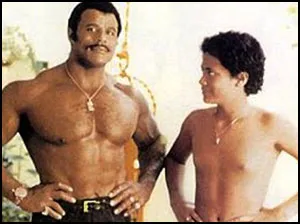
Rocky & Dwayne Johnson
Not long after his retirement from pro wrestling, Johnson’s son Dwayne decided he wanted to try his hand at being a pro wrestler. Knowing the difficulties of a career inside of the squared circle, Rocky was skeptical at first, but, he eventually saw that Dwayne was serious about his decision and he agreed to train his son for a career in the ring. After spending some time working out with Dwayne and showing him the basics, Rocky felt that his son was capable enough to move on to the next phase. He made a call to his old friend (and high-level WWF employee) Pat Patterson, asking if he could come to Florida and take a look at Dwayne. Patterson agreed and the rest, as they say, is history. As for Rocky Johnson, he was later offered (and accepted) a job by the WWF to become a trainer/coach in Louisville, Kentucky at the promotion’s developmental group, Ohio Valley Wrestling, before permanently retiring from professional wrestling.
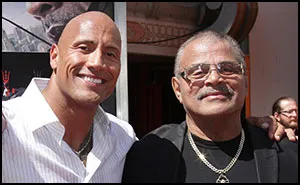 Rocky Johnson is a member of the St. Louis Wrestling Hall of Fame (2008) and the WWE Hall of Fame (2008). In December of 2019, just weeks before his death, Johnson joined the Board of Directors of the International Pro Wrestling Hall of Fame.
Rocky Johnson is a member of the St. Louis Wrestling Hall of Fame (2008) and the WWE Hall of Fame (2008). In December of 2019, just weeks before his death, Johnson joined the Board of Directors of the International Pro Wrestling Hall of Fame.
“Soul Man” Rocky Johnson passed away due to a heart attack caused by a pulmonary embolism on January 15, 2020 at the age of 75.
